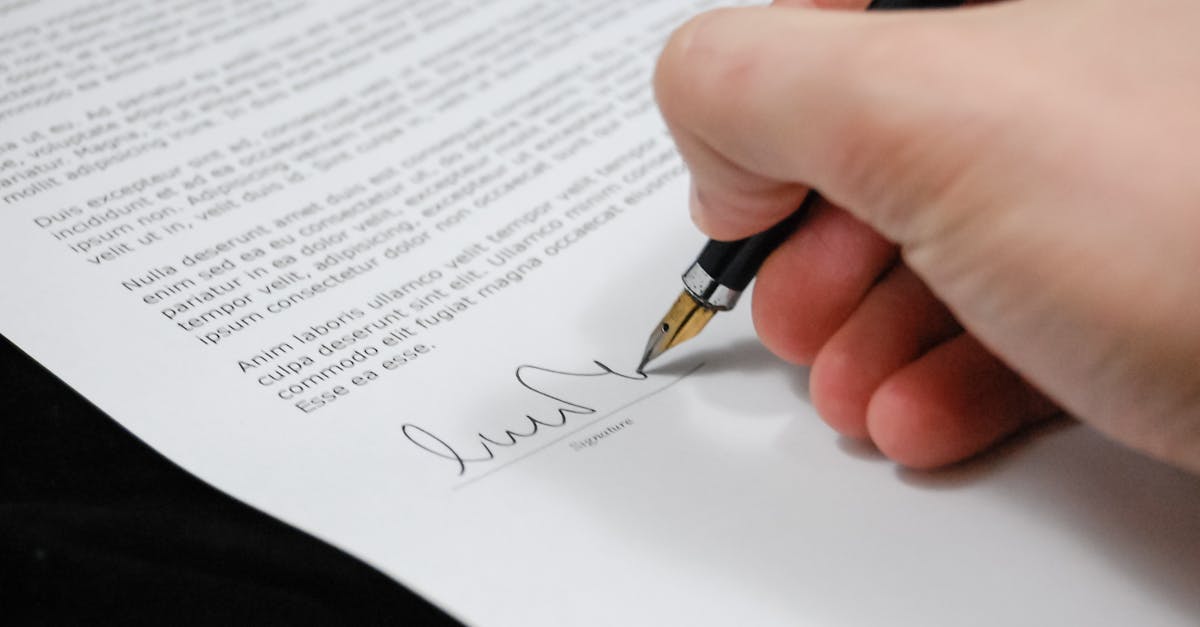
Steps to take after drafting a legal document
After drafting legal documents, it is crucial to take the time to carefully review and revise the content. This step ensures that the document accurately reflects your intentions and adheres to all legal requirements. Checking for spelling errors, grammatical mistakes, and inconsistencies in the language used is essential to prevent any misinterpretations. Additionally, verifying that all necessary information is included and correctly formatted can help avoid delays or complications in the future.
Once you have thoroughly reviewed and revised the drafted legal document, it is advisable to seek a second opinion. Consulting with a legal professional or someone experienced in the specific area of law covered by the document can provide valuable insights and feedback. This external review can help identify any potential issues or areas for improvement that may have been overlooked during the drafting process. Ultimately, obtaining a fresh perspective can help ensure the document is comprehensive, accurate, and legally sound.
Reviewing and revising the drafted legal document
Reviewing and revising the drafted legal document is a crucial step in the process of creating a legally binding document. It is essential to carefully scrutinize the language used, ensuring that it accurately reflects the intended terms and conditions. By revisiting the document with a critical eye, you can identify any errors or ambiguities that may undermine its validity.
In the review process, pay close attention to any discrepancies or contradictions within the document. Ensure that all parties involved are accurately identified, and that the language used is clear and unambiguous. Additionally, verify that the document complies with any relevant laws or regulations. By diligently reviewing and revising the drafted legal document, you can help mitigate the risk of misunderstandings or disputes down the line.
Importance of legal document notarization
Legal document notarization serves as a crucial step in solidifying the validity and authenticity of legal documentation. Notarization involves a notary public verifying the identities of the parties involved in the document, as well as ensuring that they are signing under their own volition and without any undue influence. By having a legal document notarized, parties can provide additional assurance that the contents of the document accurately reflect their intentions and commitments. This can be especially important in legal matters where evidence of authenticity is crucial for the enforceability of the document in question.
Drafting legal documents is just one part of the process; ensuring that these documents are notarized can add an extra layer of protection and credibility. Notarization serves as a form of certification that the signatures on the document are authentic and that all parties are in agreement with the terms outlined. This can be particularly significant in situations where the document may come under scrutiny or challenge in the future. By obtaining notarization for your legal documents, you are taking a proactive step towards safeguarding the integrity and enforceability of your agreements.
Ensuring validity and authenticity of legal documents
Drafting legal documents requires a keen eye for detail to ensure their validity and authenticity. When self-drafting legal documents, it is essential to be meticulous in accurately capturing the intended provisions and terms. This attention to detail helps in avoiding ambiguity or loopholes that could potentially invalidate the document. Additionally, double-checking the information provided and ensuring that all necessary legal language is included can further enhance the document's credibility.
To safeguard the authenticity of self-drafted legal documents, it is advisable to seek guidance from legal professionals or advisors for review. Having a legal expert assess the document can offer valuable insights into potential legal pitfalls or oversights. Furthermore, consulting with a notary public to officially notarize the document can add an extra layer of assurance regarding its authenticity. By taking these precautionary measures, individuals can bolster the validity of their self-drafted legal documents and mitigate any risks associated with inaccuracies or oversight.
Legal implications of using DIY legal documents
Drafting legal documents without professional legal assistance may result in serious consequences. One of the key issues with DIY legal documents is the potential lack of precision or clarity in the language used. Legal terminology is intricate, and minor errors in phrasing can lead to misinterpretation or ambiguity, leaving room for disputes or legal challenges in the future. Inaccurate or incomplete information within self-drafted documents can also render them unenforceable or invalid, causing delays, financial losses, or even legal penalties.
Another significant concern is the risk of overlooking crucial legal requirements or specifics that are essential for the document's validity. Legal documents often need to comply with specific formatting, witnessing, or signing requirements to be legally binding. Without the guidance of a legal professional, individuals drafting their own documents may miss these critical details, leaving their agreements open to scrutiny or dismissal if not executed correctly. In legal matters, precision and adherence to legal standards are paramount, highlighting the importance of seeking professional help when creating crucial legal documents.
How selfdrafted documents hold up in court
Drafting legal documents without the guidance of a legal professional can lead to uncertainties about their enforceability in court. The courts typically hold self-drafted documents to the same standard as those prepared by lawyers. However, the lack of legal expertise and attention to detail in self-drafted documents can sometimes result in challenges to their validity during legal proceedings. Judges may scrutinize self-drafted documents more closely to ensure that they comply with relevant laws and regulations. Therefore, individuals relying on self-drafted legal documents should be prepared to defend their accuracy and legality in court.
While self-drafted legal documents may stand up in court if properly executed and contain all the necessary elements, they may still be subject to greater scrutiny compared to documents drafted by legal professionals. Errors or omissions in self-drafted documents could potentially lead to disputes over their validity, putting individuals who rely on them at a disadvantage. It is crucial for individuals considering drafting their own legal documents to thoroughly research the relevant laws and seek guidance to ensure the documents are comprehensive, accurate, and legally sound.
FAQS
Can I draft my own legal documents?
Yes, you can draft your own legal documents, but it is important to ensure they are accurate and legally binding.
What are the risks of drafting my own legal documents?
The risks of drafting your own legal documents include potential errors, lack of legal expertise, and the possibility of creating documents that are not legally enforceable.
How can I ensure the validity of self-drafted legal documents?
To ensure the validity of self-drafted legal documents, it is advisable to seek guidance from a legal professional to review and provide feedback on the document.
Are there specific legal documents that are better left to professionals?
Complex legal documents such as wills, trusts, and contracts involving significant assets are better left to professionals to ensure accuracy and avoid potential legal issues in the future.
What should I do after drafting a legal document myself?
After drafting a legal document yourself, it is crucial to have it reviewed by a legal expert to identify any potential issues and make necessary revisions to ensure its legality and enforceability.
